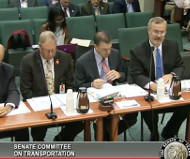Article from: www.thenewspaper.com/news/50/5044.asp
9/16/2016
Texas Lawmakers Review Cost Of Eliminating Toll Roads
Texas state Senate committee sees $36.7 billion cost to eliminate toll booths on all highways.
 Texas lawmakers interested removing the toll booths from state highways were hit by sticker shock on Wednesday. The state Senate Transportation Committee on Wednesday heard testimony from Texas Department of Transportation (TxDOT) witnesses who explained that the total cost of going toll-free would be $36.7 billion due to the complex nature of the transactions involved.
Texas lawmakers interested removing the toll booths from state highways were hit by sticker shock on Wednesday. The state Senate Transportation Committee on Wednesday heard testimony from Texas Department of Transportation (TxDOT) witnesses who explained that the total cost of going toll-free would be $36.7 billion due to the complex nature of the transactions involved.
"Unlike a mortgage or car loan, which can typically be paid off at any time, long-term fixed-rate toll revenue bonds generally include terms that ensure the bond holder will receive interest payments for a minimum period of time," a TxDOT report explained. "These bonds can still be paid off at any time, but the issuer must pay the original principal amount of the bond as well as the interest that is due to the bond holder during this minimum guaranteed period of time."
Texas has 230 miles of state-run toll roads and 441 miles of private and foreign-owned toll roads. Because the borrowing costs for many of the projects extends out to the year 2056, meeting the "interest due" is substantial.
"Who thinks that 40 years of debt is a good idea?" state Senator Lois W. Kolkhorst asked. "I don't want to pontificate here, but, wow."
When TxDOT builds a road in the traditional manner, it relies on bonds that enjoy a AAA rating and a substantially lower borrowing cost. The Austin-area's Central Texas Turnpike, for example, borrowed at a 6 percent rate compared to the 3 percent rate for non-tolled financing.
"For toll roads... typically those are going to start off as BBB rated, therefore carrying a higher interest rate," TxDOT executive director James M. Bass told the committee on Wednesday.
TxDOT did recently refinance several of the toll roads to save $1 billion without extending repayment periods for the project, but there are other financial considerations. The agency's report explained toll roads charge motorists billions of dollars over and above the cost of building and operating the road, so removing tolls would mean these funds would no longer be available to subsidize other modes of transportation, such as rail and bicycle lanes. The Central Texas Turnpike, for instance, will collect a projected $6.3 billion through 2035 while incurring only $5.4 billion in debt service and maintenance costs, leaving $900 million in profit.
"The surplus money over and above what's needed to operate and maintain and pay the debt service can be used to accelerate that debt payment to pay it off early, or it can be used in the region of that project to deliver other transportation projects," Bass said. "The third one I would mention is that sometimes they're put in reserve accounts for future maintenance."
As repaving highways is extremely expensive, a reserve account can be used to slowly build funds for that purpose over ten or more years.
Lawmakers could also choose to free roads one-by-one. Paying off just the Central Texas Turnpike in a lump sum, for instance, would run $3.2 billion. Waiting until 2023 would reduce the cost to $2.5 billion. If lawmakers were to devote the toll road's profits to nothing other than paying off debt, it could go toll-free in 2035. Some lawmakers did not see much sense in this method of financing transportation, and they were even more upset that TxDOT paid the full cost of building several toll roads before handing private companies more than half of the profits for collecting tolls on those roads.
"This is not right," Kolkhorst said. "I think it's incumbent upon us to look at these kinds of deals... We paid even more for the road than we would have if would have been non-tolled."
A copy of the report is available in a 2.3mb PDF file at the source link below.
Source: Report on the Elimination of Toll Roads (Texas Department of Transportation, 9/1/2016)
Permanent Link for this item
Return to Front Page
 Texas lawmakers interested removing the toll booths from state highways were hit by sticker shock on Wednesday. The state Senate Transportation Committee on Wednesday heard testimony from Texas Department of Transportation (TxDOT) witnesses who explained that the total cost of going toll-free would be $36.7 billion due to the complex nature of the transactions involved.
Texas lawmakers interested removing the toll booths from state highways were hit by sticker shock on Wednesday. The state Senate Transportation Committee on Wednesday heard testimony from Texas Department of Transportation (TxDOT) witnesses who explained that the total cost of going toll-free would be $36.7 billion due to the complex nature of the transactions involved.